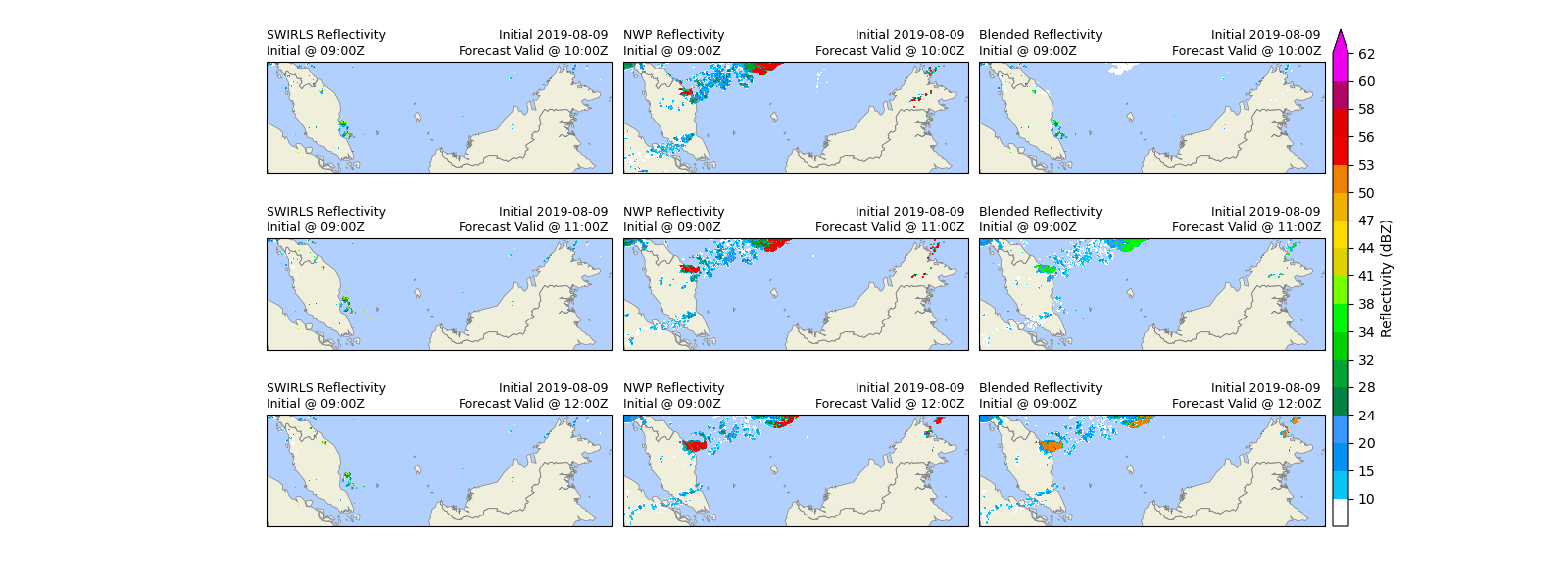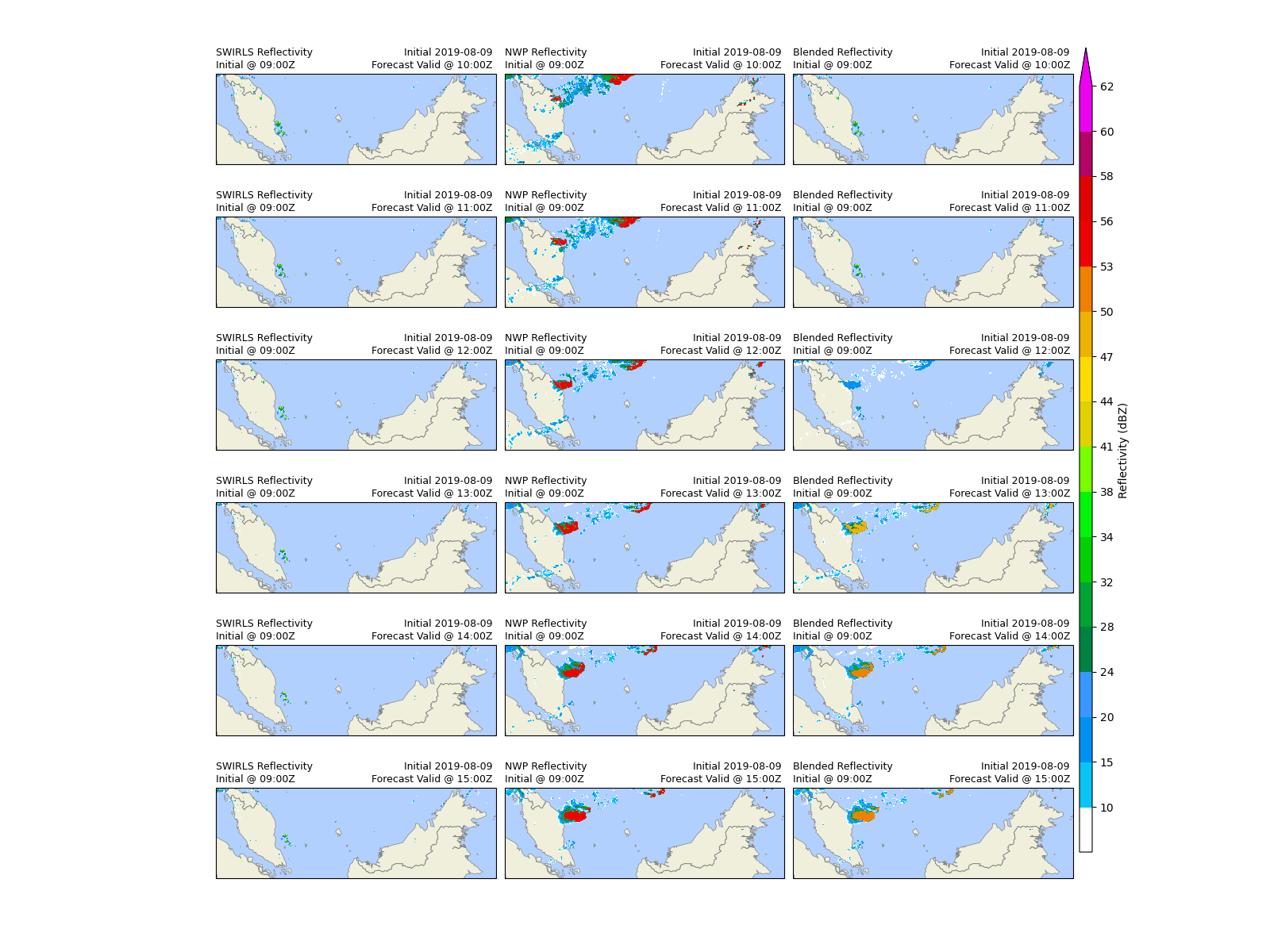Note
Click here to download the full example code
Radar Advection with NWP Blend (Malaysia)
This example shows the technique of blending Numerical Weather Forecast (NWP) with COM-SWIRLS output to generate operational deterministic QPF up to 3 and 6 hours ahead. NWP data was generated using the WRF Model while radar data was taken from the Malaysian radar observation network
Definitions
Import all required modules and methods:
# Python package to allow system command line functions
import os
# Python package to manage warning message
import warnings
# Python package for timestamp
import pandas as pd
# Python package for xarrays to read and handle netcdf data
import xarray as xr
# Python package for numerical calculations
import numpy as np
# Python package for reading map shape file
import cartopy.io.shapereader as shpreader
# Python package for land/sea features
import cartopy.feature as cfeature
# Python package for projection
import cartopy.crs as ccrs
# Python package for creating plots
from matplotlib import pyplot as plt
# Python package for output import grid
from matplotlib.gridspec import GridSpec
# Python package for colorbars
from matplotlib.colors import BoundaryNorm, ListedColormap
# Python package for scalar data to RGBA mapping
from matplotlib.cm import ScalarMappable
# Python com-swirls package to standardize attributes
from swirlspy.utils import standardize_attr, FrameType
# Python com-swirls package to calculate motion field (rover) and semi-lagrangian advection
from swirlspy.qpf import rover, sla
# Python com-swirls package to blend nwp and nowcast (RaINS)
from swirlspy.blending import rains, nwp_bias_correction
# directory constants
from swirlspy.tests.samples import DATA_DIR
from swirlspy.tests.outputs import OUTPUT_DIR
warnings.filterwarnings("ignore")
start_time = pd.Timestamp.now()
Initializing
This section demonstrates the extraction of radar & nwp data from netcdf into python
Step 1: Define your input data directory and output directory
# Supply the directory of radar and nwp data
data_dir = os.path.abspath(
os.path.join(DATA_DIR, 'netcdf_ms')
)
Step 2: Define a basetime
# Supply basetime
basetime = pd.Timestamp('201908090900')
Step 3: Read data files from the radar data using xarray()
# Radar data listed from the basetime[0] --> 3 hours before the basetime[17] (descending time)
interval = 10 # Interval of radar data
radar_datas = []
for i in range(0, 18):
t = basetime - pd.Timedelta(minutes=i * interval)
# Radar data nomenclature
filename = os.path.join(
data_dir,
t.strftime("radar_d03_%Y-%m-%d_%H_%M_00.rapids.nc")
)
reflec = xr.open_dataset(filename)
radar_datas.append(reflec)
# Concatenate list by time
reflec_concat = xr.concat(radar_datas, dim='time')
# Extracting the radar data: The radar dBZ variable is named 'Zradar', therefore, we extract 'Zradar'
radar = reflec_concat['Zradar']
# Reversing such that time goes from earliest to latest; 3 hours before basetime[0] --> basetime[17]
radar = radar.sortby('time', ascending=True)
Step 4: Reading nwp netcdf data into xarray
# NWP data listed from the basetime[0] --> 3 and 6 hours AFTER basetime[17] (nowcast)
nwp_3hr_datas = []
nwp_6hr_datas = []
for i in range(0, 36):
t = basetime + pd.Timedelta(minutes=i * interval)
# Radar nwp nomenclature
filename = os.path.join(
data_dir,
t.strftime("wrfout_d03_%Y-%m-%d_%H_%M_00.rapids.nc")
)
reflec = xr.open_dataset(filename)
nwp_6hr_datas.append(reflec)
if i < 18:
nwp_3hr_datas.append(reflec)
# Concatenating the nwp reflectivity list of data by time
reflec_3hr_concat = xr.concat(nwp_3hr_datas, dim='time')
reflec_6hr_concat = xr.concat(nwp_6hr_datas, dim='time')
# Extracting the nwp data: The nwp dBZ variable is called 'zwrf', extracting 'zwrf'
nwp_3hr = reflec_3hr_concat['zwrf']
nwp_6hr = reflec_6hr_concat['zwrf']
initialising_time = pd.Timestamp.now()
Step 5: Bias correction of nwp data The objective of bias correction is to match the nwp percentile to the radar percentile This is also known as frequency matching.
nwp_3hr_corrected = nwp_bias_correction(radar, nwp_3hr)
nwp_6hr_corrected = nwp_bias_correction(radar, nwp_6hr)
bias_correction_time = pd.Timestamp.now()
Nowcast (SWIRLS-Radar-Advection)
The swirls radar advection was performed using the observed radar data Firstly, some attributes necessary for com-swirls input variable is added Secondly, rover function is invoked to compute the motion field Thirdly, semi-lagrangian advection is performed to advect the radar data using the rover motion field
# Adding in some attributes that is step_size <10 mins in pandas.Timedelta>, zero_value <9999.> frame_type <FrameType.dBZ>
radar.attrs['step_size'] = pd.Timedelta(minutes=10)
standardize_attr(radar, frame_type=FrameType.dBZ, zero_value=np.nan)
# Rover motion field computation
motion = rover(radar)
rover_time = pd.Timestamp.now()
# Semi-Lagrangian Advection
swirls = sla(radar, motion, 35) # Radar time goes from earliest to latest
sla_time = pd.Timestamp.now()
RUNNING 'rover' FOR EXTRAPOLATION.....
Blending (RaINS)
Blending Numerical Weather Forecast (NWP) with COM-SWIRLS output to generate operational deterministic QPF up to 3 hours ahead.
blended_3hr = rains(nwp_3hr_corrected, swirls[0:18])
blended_6hr = rains(nwp_6hr_corrected, swirls)
rains_time = pd.Timestamp.now()
Plotting result
Step 1: Defining the dBZ levels, colorbar parameters and projection
# levels of colorbar (dBZ)
levels = [-32768, 10, 15, 20, 24, 28, 32, 34, 38, 41, 44,
47, 50, 53, 56, 58, 60, 62]
# hko colormap for dBZ at each levels
cmap = ListedColormap([
'#FFFFFF', '#08C5F5', '#0091F3', '#3898FF', '#008243', '#00A433',
'#00D100', '#01F508', '#77FF00', '#E0D100', '#FFDC01', '#EEB200',
'#F08100', '#F00101', '#E20200', '#B40466', '#ED02F0'
])
# boundary
norm = BoundaryNorm(levels, ncolors=cmap.N, clip=True)
# scalar data to RGBA mapping
scalar_map = ScalarMappable(cmap=cmap, norm=norm)
scalar_map.set_array([])
# Defining plot parameters
map_shape_file = os.path.abspath(os.path.join(
DATA_DIR,
'shape/se_asia_s'
))
# coastline and province
se_asia = cfeature.ShapelyFeature(
list(shpreader.Reader(map_shape_file).geometries()),
ccrs.PlateCarree()
)
# output area
extents = [99, 120, 0.5, 7.25]
# base_map plotting function
def plot_base(ax: plt.Axes):
ax.set_extent(extents, crs=ccrs.PlateCarree())
# fake the ocean color
ax.imshow(np.tile(np.array([[[178, 208, 254]]],
dtype=np.uint8), [2, 2, 1]),
origin='upper',
transform=ccrs.PlateCarree(),
extent=[-180, 180, -180, 180],
zorder=-1)
# coastline, state, color
ax.add_feature(se_asia,
facecolor=cfeature.COLORS['land'], edgecolor='none', zorder=0)
# overlay coastline, state without color
ax.add_feature(se_asia, facecolor='none',
edgecolor='gray', linewidth=0.5)
ax.set_title('')
Step 2: Filtering values <= 5dbZ are not plotted
nwp_3hr_corrected = nwp_3hr_corrected.where(nwp_3hr_corrected > 5, np.nan)
blended_3hr = blended_3hr.where(blended_3hr > 5, np.nan)
nwp_6hr_corrected = nwp_6hr_corrected.where(nwp_6hr_corrected > 5, np.nan)
blended_6hr = blended_6hr.where(blended_6hr > 5, np.nan)
Step 3: Plotting the swirls-radar-advection, nwp-bias-corrected, blended 3 hours ahead
fig: plt.Figure = plt.figure(
figsize=(3 * 5 + 1, 3 * 2),
frameon=False
)
gs = GridSpec(
3, 3, figure=fig,
wspace=0.03, hspace=0, top=0.95, bottom=0.05, left=0.17, right=0.845
)
for row in range(3):
time_index = (row + 1) * 6 - 1
timelabel = basetime + pd.Timedelta(interval * (time_index + 1), 'm')
for col in range(3):
ax: plt.Axes = fig.add_subplot(
gs[row, col],
projection=ccrs.PlateCarree()
)
if col % 3 == 0:
z = swirls[time_index].values
lats = swirls[time_index].latitude
lons = swirls[time_index].longitude
title = 'SWIRLS Reflectivity'
elif col % 3 == 1:
z = nwp_3hr_corrected[time_index].values
lats = nwp_3hr_corrected[time_index].lat
lons = nwp_3hr_corrected[time_index].lon
title = 'NWP Reflectivity'
elif col % 3 == 2:
z = blended_3hr[time_index].values
lats = blended_3hr[time_index].latitude
lons = blended_3hr[time_index].longitude
title = 'Blended Reflectivity'
# plot base map
plot_base(ax)
# plot reflectivity
ax.contourf(
lons, lats, z, 60,
transform=ccrs.PlateCarree(),
cmap=cmap, norm=norm, levels=levels
)
ax.set_title(
f"{title}\n" +
f"Initial @ {basetime.strftime('%H:%MZ')}",
loc='left', fontsize=9
)
ax.set_title('')
ax.set_title(
f"Initial {basetime.strftime('%Y-%m-%d')} \n" +
f"Forecast Valid @ {timelabel.strftime('%H:%MZ')} ",
loc='right', fontsize=9
)
cbar_ax = fig.add_axes([0.85, 0.105, 0.01, 0.845])
cbar = fig.colorbar(
scalar_map, cax=cbar_ax, ticks=levels[1:], extend='max', format='%.3g'
)
cbar.ax.set_ylabel('Reflectivity (dBZ)', rotation=90)
fig.savefig(
os.path.join(
OUTPUT_DIR,
"swirls_nwp_blend_ms_3hr.png"
),
dpi=450,
bbox_inches="tight",
pad_inches=0.1
)

Step 4: Plotting the swirls-radar-advection, nwp-bias-corrected, blended 6 hours ahead
fig: plt.Figure = plt.figure(
figsize=(3 * 5 + 1, 6 * 2),
frameon=False
)
gs = GridSpec(
6, 3, figure=fig,
wspace=0.03, hspace=0, top=0.95, bottom=0.05, left=0.17, right=0.845
)
for row in range(6):
time_index = (row + 1) * 6 - 1
timelabel = basetime + pd.Timedelta(interval * (time_index + 1), 'm')
for col in range(3):
ax: plt.Axes = fig.add_subplot(
gs[row, col],
projection=ccrs.PlateCarree()
)
if col % 3 == 0:
z = swirls[time_index].values
lats = swirls[time_index].latitude
lons = swirls[time_index].longitude
title = 'SWIRLS Reflectivity'
elif col % 3 == 1:
z = nwp_6hr_corrected[time_index].values
lats = nwp_6hr_corrected[time_index].lat
lons = nwp_6hr_corrected[time_index].lon
title = 'NWP Reflectivity'
elif col % 3 == 2:
z = blended_6hr[time_index].values
lats = blended_6hr[time_index].latitude
lons = blended_6hr[time_index].longitude
title = 'Blended Reflectivity'
# plot base map
plot_base(ax)
# plot reflectivity
ax.contourf(
lons, lats, z, 60,
transform=ccrs.PlateCarree(),
cmap=cmap, norm=norm, levels=levels
)
ax.set_title(
f"{title}\n" +
f"Initial @ {basetime.strftime('%H:%MZ')}",
loc='left', fontsize=9
)
ax.set_title('')
ax.set_title(
f"Initial {basetime.strftime('%Y-%m-%d')} \n" +
f"Forecast Valid @ {timelabel.strftime('%H:%MZ')} ",
loc='right', fontsize=9
)
cbar_ax = fig.add_axes([0.85, 0.105, 0.01, 0.845])
cbar = fig.colorbar(
scalar_map, cax=cbar_ax, ticks=levels[1:], extend='max', format='%.3g'
)
cbar.ax.set_ylabel('Reflectivity (dBZ)', rotation=90)
fig.savefig(
os.path.join(
OUTPUT_DIR,
"swirls_nwp_blend_ms_6hr.png"
),
dpi=450,
bbox_inches="tight",
pad_inches=0.1
)
radar_image_time = pd.Timestamp.now()

Checking run time of each component
print(f"Start time: {start_time}")
print(f"Initialising time: {initialising_time}")
print(f"NWP bias correction time: {bias_correction_time}")
print(f"SLA time: {sla_time}")
print(f"RaINS time: {rains_time}")
print(f"Plotting radar image time: {radar_image_time}")
print(f"Time to initialise: {initialising_time - start_time}")
print(
f"Time to run NWP bias correction: {bias_correction_time - initialising_time}")
print(f"Time to run rover: {rover_time - bias_correction_time}")
print(f"Time to perform SLA: {sla_time - rover_time}")
print(f"Time to perform RaINS: {rains_time - sla_time}")
print(f"Time to plot radar image: {radar_image_time - rains_time}")
Start time: 2026-01-03 11:11:07.201802
Initialising time: 2026-01-03 11:11:11.098772
NWP bias correction time: 2026-01-03 11:12:20.783802
SLA time: 2026-01-03 11:16:03.279437
RaINS time: 2026-01-03 11:16:10.595509
Plotting radar image time: 2026-01-03 11:16:56.130927
Time to initialise: 0 days 00:00:03.896970
Time to run NWP bias correction: 0 days 00:01:09.685030
Time to run rover: 0 days 00:00:01.079583
Time to perform SLA: 0 days 00:03:41.416052
Time to perform RaINS: 0 days 00:00:07.316072
Time to plot radar image: 0 days 00:00:45.535418
Total running time of the script: ( 5 minutes 50.096 seconds)